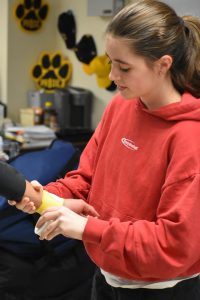Students stage protest in support of Black Lives Matter
October 20, 2020
While racial tensions heightened over the summer as a result of the murders of George Floyd and Breonna Taylor, young black men and women became increasingly tired of the all too common circumstance that is police brutality. Spurred by the murders, U. City students took the responsibility into their own hands and staged a protest in August.
“We’re disappointed but not surprised, it’s been a common theme for us,” Michael Simmons, sophomore, said. “For centuries, I mean, decades.”
The killing of Breonna Taylor was followed by a grand jury verdict in Louisville, Kentucky to not indict the officers accused. Simmons feels that the events preceding the grand jury decision speak volumes about the perception of black lives.
“The fact that they declared a state of emergency [in Louisville] before the verdict was announced, we all knew what was happening,” Simmons said. “I think that it just proves that we have to continue to march, we have to continue to fight, we have to continue to protest and use our voices, and we also have to use our votes to make sure that when our children are here, we don’t have to tell them to call us every step of the way to make sure they didn’t get killed by a police officer.”
Although the odds may be stacked against young black men and women,Simmons views this generation as a beacon of hope.
“It’s a sad reality that we live in right now, but I think that things can change,” Simmons said.” I see this generation almost as a spark and a fire that I don’t think has really surely been there. We have so many more resources now that I think will benefit us in the future.”
Protesting is one of the most effective ways to warrant change. From the bus boycotts led by Martin Luther King Jr., to the annual women’s march that rallies over a million people, protesting continues to change the world in our day-to-day lives.
With the opportunity to have a protest presented itself, many students jumped at the opportunity.
“I thought that it was very important that somebody saw a young black guy speaking, just because this is a movement where young black men are affected by this issue disproportionately,” Simmons said. “I just knew I had to speak up.”
However, COVID-19 proved to be a difficult obstacle to overcome. Fellow protest organizer Michaela Flowers, sophomore, found it difficult to plan under the socially-distanced circumstances.
“During the beginning, communication was definitely a struggle,” Flowers said. “In our original group there were a lot of dominant personalities, so trying to just get everybody together and make sure everybody’s voices were heard and everybody’s ideas were heard was a struggle.”
Despite the various hurdles, the group managed to work around the conditions.
“We were able to pull off a pretty successful march in my opinion, but I do think that Covid was a very big obstacle just because it was hard to meet up in person to go over the routes,” Flowers said.
With the help of Dr. Sharonica Hardin-Bartley, superintendent, challenges became a thing of the past.
“Dr. Hardin was our biggest supporter from day one,” Simmons said.“Every and any time we needed something she was very reasonable. She always made sure that we got what we wanted and what we needed.Without her this would’ve been impossible.”
With tensions between the African American community and police as relevant as ever, the decision to have the police chaperone was a conflict of interest.
“Everything was resolved quickly when we talked to the superintendent,” Khloé Fox, junior and a lead organizer of the protest, said. “She only intended for the police to be there for safety reasons. They didn’t block off major intersections, and their attendance was only to ensure that all protesters were safe from oncoming traffic.”
Using protesting as a way to strongly voice an opinion, the students don’t plan to stop exercising their freedom of speech anytime soon.
“This isn’t the end,” Fox said. “Soon we’ll be talking about breaking the connection between the police department and St. Louis Public Schools.”
In the end, the point of orchestrating the protest was to get a message across, which the team believes needs to be a continuous and widespread process.
Said Flowers, “We need immediate action right now. Whether that is using your voice. Using your privilege, or using your power, whenever you can, by any means necessary.”







































